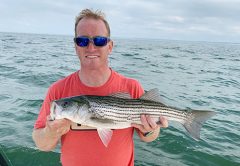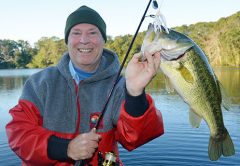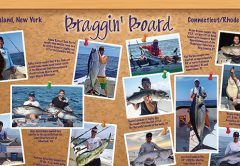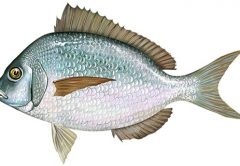I am not a fifth-generation fisherman. I have never warped planks to replace the rub rail on a 60-foot wooden dragger. And while I can disassemble just about any marine propulsion system, I’m not aware of a single engine I could put back together in anything close to working order. Hell, when I started out on deck in the mid 1990s, I was a googan’s googan — a guy with all the seafaring aptitude of a three-legged Clydesdale. I mention this because, if I occasionally write something that sounds pretty sharp in the nautical department, it reflects something I learned the hard way—something I fought every grain of my personal inclinations to eventually understand.
This is important because the subject of this month’s “Fish Focus” is working in some part of our fair state’s considerable marine industry. I’m in no way qualified to deliver a lecture on building a high-power career path toward financial achievement. Based on my own schizophrenic career choices like trying to amount to something as a writer and as a deckhand in the same span of years — the only sermon I might deliver with enormous personal credibility might be called “Work More and Earn Way Less — Right Now!”
Then again, having navigated the bulk of my adult life in strict avoidance of a 9-to-5 cubicle existence, I might well be the guy to talk about building a career around your passions in life. There’s more than one measure of success — one of which is finding a job that doesn’t leave you retching and shuddering when the alarm snaps you back to the land of the living every morning. I have written and fished because I love writing and fishing. And while I wouldn’t necessarily recommend that brand of professional (i.e. financial) lunacy to most readers, I firmly believe that if you live for your time on or near the water, and hate whatever flatland career you’ve been lashed to for years, you really ought to consider making a leap. That jump is nowhere near as blind as you might think.
In fact, at a point when most of the headlines suggest that our seas are barren and all our watermen destitute, you might be surprised to learn that Rhode Island is a major hub for marine trades. Further, among businesses directly tied to Ocean State waters, numerous employers are in crying need of good, qualified help. It has been a hot topic for years at the national level of the marine industries that as Baby Boomers head toward retirement, there simply aren’t nearly enough people enter- ing trades to fill the slots vacated by retirees. And as the various marine power and electronics systems continue to evolve at a quantum rate, and as boat builders and other marine businesses come back to life after a major constriction since 2008, the employer demand for all kinds of marine technicians—and willingness to groom good help—will be on the rise. And yes, that’s true even in our state, despite its well deserved reputation in recent years as a na- tional stronghold for unemployment.
The catch—here’s where this little entry comes full circle is that almost every gig involving boats and water requires a fair amount of specialized knowledge. And believe you me, there’s no reliable way to attain that knowledge than to learn by doing, under the guidance of a seasoned expert. This fact is not lost on the folks in our state most committed to lining up marine businesses with help they cannot find: The Rhode Island Marine Trades Association, working in conjunction with the International Yacht Restoration School in Newport, several school systems, and a growing host of marine businesses state- wide, has put together a PreApprenticeship Program using state grant monies to help highly-motivated candidates find a fast-track toward gainful long-term employment in our home state. You can get the full rundown on this program, which is open to job-seekers of all ages, in Cynthia Goss’s piece on page 5.
Another avenue, more closely aligned with my own professional time on the water, is working on boats, fishing and otherwise. “How do I get a fishing job?” is a question I’ve gotten with surprising regularity over my career — and a question I’ve dodged or ignored almost every time it arises. Since we’re already on the subject, this seems a good time to finally tackle an answer that’s long overdue.
The fact is that, thanks to the grim economy you might have noticed, charter and party-boat bookings are off from levels of three to five years ago by a significant margin, a trend that has created compound problems for the fleet as a whole. For one thing, the revenue constriction has had a consolidating effect, pushing part-time businesses aside and concentrating remaining available business on a smaller handful of boats, and taking a chunk out of even the highliner boats’ total fishing schedules. The most troubling ripple effect in terms of the employment situation is that there are dramatically fewer boats that are busy enough to carry full-time deckhands, and more importantly, to provide the kind of repetition it takes to really learn the trade right. Charter fishing, like all professional fishing, is learned by a backhanded apprenticeship and an insane amount of practice. The bad news is that to learn the racket at the highest level, you’re looking a tiny minority of the overall fleet that can deliver that sort of training.
That said, one good way to get your foot in the door is to hit either part-time boats who might need someone for weekends mainly, or one of the few headboats running out of Point Judith, making yourself available for night trips or other sleepless time slots, which are harder for captains to cover with reliable mates. The bottom line is that learning the trade these days will require near-ferocious determination, a willingness to learn on your own time, and acceptance that you will suffer some major frustrations just trying to get off the dock with much consistency. You need to realize that it’s not in most captains’ best interest to hemorrhage time and energy into a greenhorn unless that greenhorn shows considerable initiative to learn the basics fast.
Speaking of greenhorns, it’s tradition that the greenest member of any crew is going to get the boring, miserable, tedious jobs—and probably for a fraction of the potential earnings (if he survives train- ing). The expectation has long been that part of the job is so-called “dock-work”— routine vessel maintenance, preparations, gear work—that is a necessary precursor to making the money out on the grounds. The boat makes the livelihood possible, but not every day’s work is an “earning” day: Dock work, you do because it needs to get done. There’s a tremendous amount more work that goes into a successful charter mission than almost any deckhand I’ve had a hand in training has realized, and there’s a lot of grunt work between the moments of glory. Of course, if you love the work, you weather the aggravation and eventually reap larger rewards.
If you’re thinking seriously about trying to nail down a fishing gig, realize that on any above-board, Coast Guard inspected charter or party boat, you’ll be required to take both pre-employment and ran- dom drug tests. Know also that any charter captain worth working for has seen a multitude of slobs and derelicts beating the docks over many seasons, and that if you expect to be taken seriously, you’ll be wise to look like you were raised by humans as opposed to, say, wild dogs.
Many captains will treat your first trips as a pressure test, working you like a rented mule for small bucks. It’s part of the game: Given the extent of training that goes into creating a seasoned mate, it’s in no one’s best interest to invest time in a guy who will evaporate just about the point when he’s worth the oilers he’s wearing.
With all that said, if you really want to learn the finer points of rod-and-reel fish- ing, trying to grab a deck job is perhaps the best way to shorten your learning curve in a big way. So how do you even go about looking for a job? Best bet will be to haunt the docks until you can talk to a live body on the boats. Again, fishing is known to attract fly-by-night acts, and you really need to give a prospective employer a visual aid that you didn’t climb out of the local gin mill dumpster — something a captain won’t know if you try to phone it in. I’ve always suggested heading for the docks on a sodden, windy May morning when (1) a boat is apt to be at the dock and (2) crew is apt to be taking advantage of the last of the down-time to get things ready before the seasonal mania begins.
Above all else, be absolutely forthright about the sort and extent of applicable skills you bring to the table. Anyone who’s been around for more than a couple seasons will know what you know within ten minutes of watching you work, so bluster and bragging you can’t substantiate with your hands won’t do you any favors when the work begins. Besides, contrary to what you’d guess, many captains would actually prefer to start with a “clean slate,” teaching a greenhorn to do each task the way he wants it done, rather than trying to erase previous bad training or work habits before re-training. Honesty’s the only safe play.
[easy-social-share]










